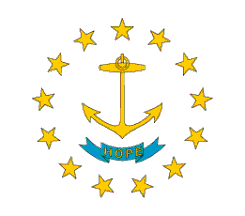Rhode Island Flag

Rhode Island News
Updated Dec.-6-2008

Rhode Island Webcam Listings
Matunuck Beach...Beach
Cam
Narragansett..Beach
Cam
Narragansett...Warm Winds
Cam
North Kingstown...Pojac
Cam
Providence...DigiCams
Providence...TeleCam
State Stuff
Rhode Island Highway Patrol
State
of Rhode Island
Rhode
Island Legislature
Rhode
Island Maps
U.S. Census Bureau: Rhode
Island
Rhode Island History
From its beginnings, Rhode Island has been distinguished by its support for freedom of conscience and action, started by Roger Williams, who was exiled by the Massachusetts Bay Colony Puritans in 1636, and was the founder of the present state capital, Providence. Williams was followed by other religious exiles who founded Pocasset, now Portsmouth, in 1638 and Newport in 1639.
Rhode Island's rebellious, authority-defying nature was further demonstrated by the burnings of the British revenue cutters Liberty and Gaspee prior to the Revolution, by its early declaration of independence from Great Britain in May 1776, its refusal to participate actively in the War of 1812, and by Dorr's Rebellion of 1842, which protested property requirements for voting.
Rhode Island, smallest of the fifty states, is densely populated and highly industrialized.
The island on which Newport is located is also called Rhode Island, and both the state and this island might have been named in honor of the Greek Island of Rhodes, possibly because of the shape of the island. There seems to be no confirmation of this. The island on which Newport is located is also known as Aquidneck. This island was the first to be populated by those who left the Massachusetts Bay Colony because of religious differences.
Providence, was founded in 1636 as a settlement by English clergyman Roger Williams, after he was banished by the Massachusetts Great and General Court. Williams selected the name in gratitude for "God's merciful providence" that the Narragansett have granted him title to the site. Anne Hutchinson was exiled from the Massachusetts Bay Colony in 1638 and brought more settlers who were attracted to the colony by the promise of religious freedom to establish Pocasset, now Portsmouth. William Coddington and others founded Newport in 1639. In 1643 Samuel Gorton founded Shawomet, now Warwick. The State of Rhode Island and Providence Plantations also gave protection to Quakers in 1657 and to Jews from Holland in 1658.
In 1776 Rhode Island became one of the Thirteen Colonies to renounce its allegiance to Great Britain. After the American Revolution, shipping declined, but Samuel Slater built the first successful U.S. cotton-textile mill at the falls of the Blackstone River, at what later was called Pawtucket, by Samuel Slater and ironmaster David Wilkinson (1790). An abundance of water power led to the rapid development of manufacturing. Rhode Island's political and economic life was dominated by mill-owners until well into the 20th century, when competition from the South resulted in a continuing decline in the state's textile industry. The recent growth of new industries such as electronics has helped to revitalize the economy.
Block Island is an island off southern Rhode Island at the eastern entrance to Long Island Sound. Named for Dutch explorer Adriaen Block who visited the island in 1614. He returned to Amsterdam in October after exploring the New England coast, sailing up the Connecticut River, and mapping the coast of Manhattan. Block Island was first settled in 1661. It became part of Rhode Island in 1663 under the Charter.
In 1786 Rhode Island farmers burned their grain, dumped their milk, and left their apples to rot in the orchards in a farm strike directed against Providence and Newport merchants who refused to accept the paper money that had depreciated to the point of being virtually worthless. The strike had little effect, since 90 percent of Americans raised their own food in their gardens and let their hogs forage in the woods for acorns.
Rhode Island's economy is built upon three powerful industries: Health services, tourism and manufacturing. Health services is the state's largest industry. Growing industries include electronics, plastics, metal products, instruments, chemicals, and boat building.
Tourism is Rhode Island's second largest industry, supporting 39,000 jobs and producing tourism-related sales which topped $3.26 billion in 2000. Manufacturing is the state's third largest industry. Rhode Island is a recognized producer of jewelry and boats, and is strong in electronics and ocean technologies. Information technology and financial services are growing industries in Rhode Island.


